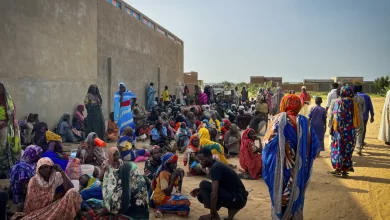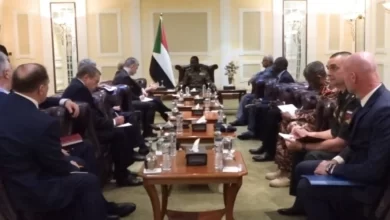Syrian Developments.. How do they affect Sudan?

Khartoum: Rhino
A whirlwind of stormy questions swept through followers, observers and those interested in the Syrian scene following the fall of the regime of ousted President Bashar Al-Assad after his family ruled Syria for more than half a century.. Questions that began with how Bashar’s regime suddenly fell, developed to the point of searching for any form of verification in regards to the possibility that the Syrian developments would cast its shadow on the Sudanese file..
Positive Developments
On the local Syrian level, the joy that colored the Syrian streets realistically expressed the human emotion in reclaiming their country after a journey of oppression and repression sponsored by Bashar Al-Assad and before him his father Hafez..
Analyses generally believe that the new developments in Syria, regardless of the motives and plans behind it, are a positive step because it expresses the will of the Syrian people for freedom and dignity, as it represents a chance for them to build a new Syria, ending decades of oppression, subjugation and civil war, which in turn will restore Syria to its historical national roles in its Arab and regional surroundings.
The situation and Complications
The fall of Bashar seemed somewhat suspicious in terms of the suddenness that characterized the fall scenario, as it didn’t take even ten days since what is known as the (Levant Liberation Front – Hayat Tahrir al-Sham ‘HTS’) announced it had taken over the reins of power in Idlib and Hama, and is actively moving towards the rest of the Syrian cities, which is a surprising turn of events in terms of the intensity of international overlaps in regards to the Syrian affair, starting with the allies of the regime itself, whether Iran or Russia, in addition to the Turkish ambitions and aspirations or the enemies of the Syrian regime such as the United States of America and its allies..
Al-Burhan’s Loss
Sudanese analysts believe that the developments in Syria are unrelated to the Sudanese situation, as they believe that in Syria’s case, external military interventions have extensions or loyalties on the ground, which suggests that the fall of Al-Assad came as a result of a bargin between international and regional actors in the context of a conflict of external axes..
For his part, the head of the Policy Committee in the Political Bureau of the National Umma Party, Eng. Imam Al-Hilu, stated in his interview with “Rhino” that firstly the Syrian people ought to be congratulated on their victory, ousting a brutal and murderous regime that squandered the rights and resources of the Syrian people. He added: “What took place is an important step at the regional level and the developments taking place in it.”
Al-Hilu believed there are ramifications for the fall of Bashar Al-Assad’s regime, as he stated: “Truthfully, it is rather difficult to predict these effects at the moment because the picture isn’t clear yet as a new regime has yet to take form, especially since the caretaker government will continue to work on arrangements for the transitional period until next February. Hence, the overall picture that determines the path and directions of the new regime isn’t clear as numerous effective and influential forces of change are plagued with tensions and conflicts.”
Al-Hilu emphasized that what happened in Syria is the biggest loss for Iran and Russia in the region, commenting: “They are both allies of one of the parties to the Sudanese war, specifically Al-Burhan’s regime, which might cast a negative impact on its part.”
He stressed that despite the lack of clarity of said overall picture regarding the new regime’s direction and its new alliances in the region, whether the Middle East or the Horn of Africa; it will undergo some major transformations, especially after the expected attack on the Houthis in the coming period, as it will have implications and an impact on the security of the Red Sea and the region.
He added: “Sudan will be affected by these transformations, whether at the level of its stability or the current ongoing war.”
Iran’s Backyard
Political analyst Othman Fadlallah, in his interview with “Rhino,” stated that with a quick overview, it can be deduced that there is no direct impact to the fall of Bashar Al-Assad in Syria on Sudan. He added: “However, if we examine the context of events, we will find that the matter is directly linked, and we will soon witness the impact of what happened in Syria on the situation in Sudan, due to the close connection between the Muslim Brotherhood Organization in Sudan and the Syrian regime over an extended period of time, as they’re in the same camp (Russia, Iran).”
Osman believes that since the outbreak of the Syrian revolution in (2011), the only president who has visited Damascus is Al-Bashir, demonstrating the strong relationship between the two parties and citing the air bridge that connects Port Sudan to Latakia. He added: “After it became impossible to import weapons through Port Sudan port, following the detention of a number of ships coming from Iran, the import of Iranian weapons was conducted through the port of Latakia, and then transported by air to Sudan. This has come to an end, making it difficult to supply weapons from Tehran.”
Fadlallah confirmed that there are indirect effects on the Sudanese scene, within the framework of the new arrangement for the Middle East that began after the October 7th attack on Israel. He shared: “It has become rather clear that the international powers no longer want Iran to have any form of presence in the Middle East, as the back of Hezbollah has been broken in Lebanon, the talons of Hamas have been clipped, and Bashar Al-Assad has been ousted. Therefore, its a mistake and a lack of appreciation for those holding the reins of decision-making to believe that Iran will be allowed to build a backyard for itself in Sudan.”
In general, and regardless of the clarity of vision or lack thereof in the compass of the movements of the new Syrian regime, political analyst Omar Sufyan Salem stated in his interview with “Rhino” that what took place is currently the reality, and the logical question is whether Syria will remain as it is or will there be another scenario for sharing influence between international actors! Omar Sufyan stated: “In my opinion, Syria will remain united as long as it is consistent with American goals, as the fall of the regime in Damascus was announced three days ago by US President-elect Trump.”
He added: “Khartoum isn’t at a similar level of priority in terms of the American agenda and its direct map, as Trump and parties in his administration are working on arranging a map in which the Islamists, Al-Burhan and his Army won’t be awarded an opportunity to maneuver or escape the requirements of the peace process without any delay, hesitation or retreat.”
Sufyan continued: “Al-Burhan’s hesitation and the shortcomings in regards to his will in confronting the Islamists are very apparent, which -in turn- means the exhaustion of his purposes and benefits that can be marketed to Washington to revolve around resolving political Islam, and accordingly, the most prominent repercussions of the Syrian scene are resolving the Sudanese file by granting the American will a free hand in shaping the region.”





